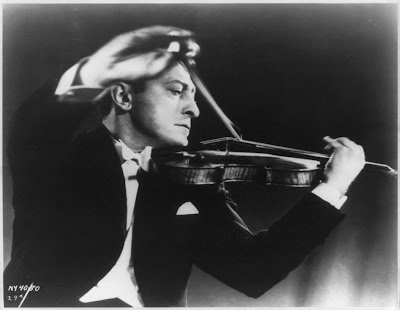Child prodigy tales tend toward a sameness, I’ve often found, but not this one – which, in any case, is much more than the story of a kid who made it big. Jascha Heifetz, born in Russia in 1901, is still considered by many to be the greatest violinist who ever lived. However you judge his music-making, by the end of the unusually fascinating film, GOD'S FIDDLER, I think you’ll agree that he makes one hell of a subject for a documentary. Although the initial narrative voices – translating into accented English what we’re simultaneously hearing spoken in Russian (soto voce in the background) is a tad annoying, Heifetz’s giant-size talent and character soon outweigh any quibbles. (Once the man comes to America, this proves beside the point, as the Russian language disappears almost entirely.)
Director Peter Rosen (shown at right) and writer Sara Lukinson keep things moving quickly in telling of this life so full and rich, and they don’t weigh things down or turn up the “style” button with any unduly annoying flourishes. (There is one nice touch: a cube full of photos that keeps turning, accompanied, of course, by the nearly ever-present and welcome violin music on the soundtrack.) The movie, as is de rigueur these days, offers a wealth of wonderful archival photos, one of which shows Helen Keller “listening” to his music with her hands. A prodigy who played his first Russian recital at age 7 and his Carnegie Hall debut in the USA at age 17, Heifetz astounded early on and kept on astounding until his death.
There was one pivotal instance, however, in which he did not astound. Having given in to the lure of life in early 20th Century America, Heifetz was becoming attached to the lifestyle (at left) of which a wealthy and famous man could partake. He had grown a bit lazy in terms of exercise and practice until a New York critic named Henderson called him on it (his first bad review) – which seemed to jolt him, notes pianist Seymour Lipkin (one of the many smart interviewees the filmmakers have corraled), into a maturity which the musician never after renounced.
We learn a lot about Heifetz’s early life (above), his family, his teachers and schooling (and how he got around the "quota" for Jews). Once he gets to America, the movie concentrates on his style, personality, the families he sired (but did not help raise), his eventual move from New York to Hollywood, his connections to Gershwin and what may have been the first electric car -- and much, much more.
All of this is riveting, not least because the man at the heart of it all remains a mystery, as many facts as pile up about him. Not given to the showy theatrics of someone like, say, conductor Leonard Bernstein, Heifetz put on no display when he played and so was accused by some of being a cold musician. The interviewees are having none of it: "Just close your eyes and listen!" insists one.
We learn what the name Jim Hoyl has in common with Heifetz, and how the musician came to greatly appreciate the Mexican song Estrellita. The guy was super-patriotic, too; the section on his time doing USO tours (at left) during WWII is eye-opening. Even more so is what kind of a family man Heifetz proved to be. Oy! After the war, he went into teaching and was, as his students explain, both a generous and a scary instructor.
Notes cellist Nathaniel Rosen, "You'd think it would have been a beautiful dream to play the violin like he did, but it cost him a lot." The idea of "having it all" comes to mind with a man as talented and successful as this one, but don't even try to imagine that. Hearing from his several secretaries and some of those students fills in the many character blanks about Heifetz, but we only begin to solve the mystery by the time the movie -- just 87 minutes -- comes to its odd and thoughtful close.
One of his students has the final personal comment about the man, and it's a humdinger -- as simple and truthful as it is profound. The final musical comment is from Mr. Rosen, and the narration ends with a comment as mysterious and enigmatic as the man himself, bringing to an end this wonderfully rich and strange documentary -- another in the increasingly lengthy list of the year's best.
God's Fiddler, opens this Friday, November 11 in New York City at the Quad Cinema -- and elsewhere, I feel sure, once word-of-mouth takes over.
Tuesday, November 8, 2011
Subscribe to:
Post Comments (Atom)













No comments:
Post a Comment